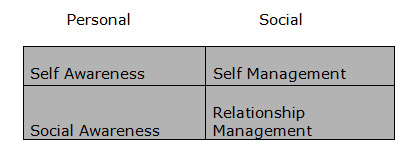What does emotional intelligence have to do with coaching?
I had the honour of facilitating a discussion with other coaches at our monthly Montreal Coaching breakfast on May 14th, 2010. The session was well attended and we were in for a treat. The participants were passionate about the subject matter and contributed their knowledge and experience making this a great learning session. This article is based on the information I presented as well as the contribution from the participants. My notes were inspired by several books that are mentioned throughout this article.
Contrary to popular belief, the history of Emotional Intelligence did not start in 1995 with Daniel Goleman’s famous book “Emotional Intelligence: Why it can matter more than IQ’’.
E.L. Thorndike, a professor at Columbia University, was the first to give emotional intelligence skills a name; his term ‘’social intelligence’’ reflected the ability of individuals having these skills to get along with other people. Howard “Gardner’s Frames of Mind: Theory of Multiple Intelligences’’ was also a great foundation that is build upon even today.
In the early 1900’s the cognitive abilities movement or IQ (Intelligent Quotient) grew. The early scientists wanted a quick way of separating average performers from the best performers. They soon discovered that this way of thinking was very limited. We are all aware that there are some very intelligent people in this world that have difficulty getting along with others. On the other hand, we know of people that are successful and great with people yet they have average intelligence. Several studies have confirmed that there is not a link between EI (Emotional Intelligence) and IQ (Intelligence Quotient); the premise being that you cannot predict someone’s EI based on their IQ.
Intelligence is your ability to learn. Many people are surprised that this does not change much after the age of 17 years old. The good news about Emotional Intelligence is that it can grow as you get older; you can increase your EQ. In fact training and development programs include coaching as a means to increase an individual’s EQ.
A concise definition of EI would be:
The ability or skill to understand/manage yourself and emotions as well as understand and manage others. In their book The Emotional Intelligence Quick Book, Travis Bradberry and Jean Greaves breakdown Emotional Intelligence into two components: Personal Competence and Social Competence.
Furthermore, the Personal Competence is composed of Self Awareness and Self Management while the Social Competence is divided into Social Awareness and Relationship Management.
In the book The EQ Edge by Steven J. Stein, PH.D. and Howard E. Book, M.D. they present the following breakdown base on Dr. Reuven Bar-On Emotional Quotient Inventory, Dr. Reuven Bar-On is a pioneer and leading authority in the field of emotional-social intelligence (EI) and psychology. He further defines the components as: Intrapersonal, Interpersonal, Adaptability, Stress Management and General Mood.
The difference between Emotional Intelligence and Behaviours or ‘’personality’’ is that individuals are basically born with a set style. Personality is based on your preferences, such as having an active behaviour or a more passive behaviour. Similar to IQ, personality cannot be used to predict emotional intelligence.
So, how important is EI in coaching? Do coaches have to have a high Emotional Intelligence Quotient? The discussion seemed to favour that coaches be ‘’there’’ for their coaching clients and believed in an on going development and learning about themselves and others to ensure that EI and its components were in the forefront. Also, coaches agreed that they indeed use Emotional Intelligence in their coaching practices to coach individuals between their ‘’current self’’ to their ‘’ideal self’’. The consensus seemed to be working with the clients strengths and building upon them; guiding the clients in their self awareness, awareness of others and how to manage themselves and others in their workplaces as well as personal lives.
In conclusion, there seems to be an interest to pursue this topic within the coaching practice in Montreal.

